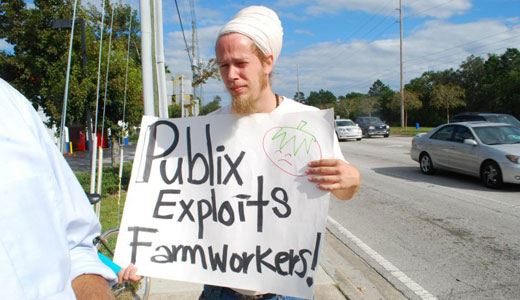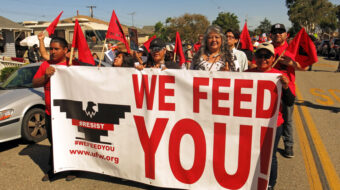
ORLANDO, Fla. – Chants of “Exploitation Ain’t the Way / Farmworkers Deserve Fair Pay!” and “Publix, Escucha! / Estamos En La Lucha!” filled the air as local progressive forces held a solidarity action outside a Publix supermarket here on Nov. 19. The purpose of the action was to pressure the giant grocery store chain into signing an agreement with the group representing the South Florida farmworkers who harvest the tomatoes that it sells.
The action was part of the Coalition of Immokalee Workers‘ Thanksgiving Week of Supermarket Action (Nov. 14-21). More than a dozen actions were planned at Publix stores mostly in Florida, along with actions around the country at Kroger stores and stores owned by Dutch supermarket conglomerate Ahold. The CIW has held numerous actions at Publix stores since its campaign against the company began in 2009.
“I work with a union that represents culinary workers and servers and bartenders, and we care because we all work in the food industry, and we all deserve to be treated with respect,” said Maggie Kalda, an organizer with UniteHERE Local 737. “I want to see Publix pay their fair share. We’re only asking for a penny more per pound of tomatoes.”
UniteHere 737 along with its sister local, UniteHERE Local 362, represent 19,000 hospitality and tourism workers in Central Florida, mostly at Disney World.
If Publix joins the coalition’s Fair Food Program, it would increase wages and improve working conditions for the 4,000 mostly immigrant Latino and Haitian farmworkers who make up the CIW. It would also be a breakthrough for the CIW in extending its Fair Food Program to the supermarket sector of the agricultural-industrial complex–in this instance, a company with around 1,100 stores in the Deep South and $27 billion in sales in 2011.
According to the CIW, growers pay harvesters around 50 cents per 32-pound bucket of tomatoes that they pick. Program participants pay an extra penny per pound for the tomatoes harvested by CIW members, with that money providing a pay raise for the harvesters.
The average annual income for farmworkers nationally is $11,000 for individuals and $16,000 for families, with farmworkers on the East Coast earning about 35 percent less than in the rest of the country, according to the Durham, N.C.-based Farmworker Advocacy Network.
“Paradoxically, many … Florida families who cannot afford to purchase their own turkey dinners are the very people who harvest the bounty that we celebrate on Thanksgiving Day,” says the CIW in a petition asking Publix to join the Fair Food Program.
“Through the Fair Food Program, farmworkers, growers and major tomato buyers are building a new tomato industry that respects and advances the human rights and dignity of farmworkers,” says the CIW.
“Yet, in the face of these historic advances, Publix, Florida’s largest privately-owned company, has for three years refused to even sit at the table with farmworkers to discuss entering into an agreement that would guarantee fair wages and dignified working conditions for the tomato pickers.”
Despite the fact that the farmworkers are part of its supply chain, the company has, so far, failed to show any meaningful sign of concern about their wages and working conditions. Publix says it doesn’t “believe ‘just paying the penny’ is the right thing to do–for Publix or our suppliers.” The company maintains that paying the farmworkers more is the responsibility of the tomato growers.
“I feel like Publix’s resistance to this is that they do not want to admit how they are involved in the agricultural food chain,” said Nico Gumbs, Florida state coordinator for YAYA (Youth and Young Adult Network of the National Farm Worker Ministry), whose Orlando branch organized the action. “They are part of the process just like John Deere and Monsanto, just like the farmworkers and the farmers.”
The company appears to be increasingly irritated by the CIW’s campaign, even going so far as to have the Rev. Clay Thomas, a Presbyterian minister, trespassed from a Sarasota, Fla., Publix in September for wearing a t-shirt in support of the CIW while ordering a sandwich from the store’s deli.
During the Orlando action, a delegation went into the store to present a letter outlining the CIW’s grievances to Publix management, who also spoke briefly with the activists.
“I feel like they were trying to be respectful [to us], but, honestly, actions speak louder than words,” said Megan Murphy, a member of Orlando YAYA who was part of the delegation.
“They say they’re going to pass the letter up [the corporate chain], but who knows if they will?” said Murphy, a regular shopper at the Publix, who said she would follow up with the store manager in a week or so to see if the letter got to the appropriate people.
The coalition has campaigned successfully to get nearly a dozen fast-food chains, food-service companies and natural food store chains to sign off on its Fair Food Program. According to the coalition, the program improves wages for tomato pickers while binding growers “to protocols and a code of conduct that explicitly include a voice for workers in health and safety issues, worker-to-worker education on the new protections under the code, and a complaint resolution procedure which workers can use without fear of retaliation.”
The latest company to join the program was Chipotle Mexican Grill. The chain, which has more than 1,200 restaurants across the U.S., signed off in October, after a six-year campaign by the CIW. Chipotle joined other companies, including McDonald’s, Taco Bell, Burger King, Aramark, Sodexo, Whole Foods and Trader Joe’s, that already participate in the program.
The coalition launched its Fair Food Campaign in 2001 with a boycott of Taco Bell, the first such action that farmworkers had ever taken against a major fast-food chain.
Photo: Image from the 2011 protests outside Publix. Ben Markeson/PW

MOST POPULAR TODAY


Zionist organizations leading campaign to stop ceasefire resolutions in D.C. area

High Court essentially bans demonstrations, freedom of assembly in Deep South

Afghanistan’s socialist years: The promising future killed off by U.S. imperialism

Communist Karol Cariola elected president of Chile’s legislature






Comments